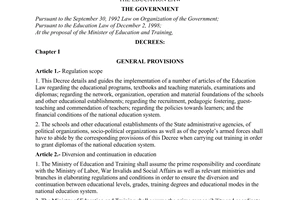Nội dung toàn văn Decision No.04/2002/QD-BGDDT of March 08, 2002 issuing the provisional regulation on the educational objectives and plans of senior secondary schools
|
THE MINISTRY OF EDUCATION AND TRAINING |
SOCIALIST REPUBLIC OF VIET NAM |
|
No: 04/2002/QD-BGDDT |
Hanoi, March 08, 2002 |
DECISION
ISSUING THE PROVISIONAL REGULATION ON THE EDUCATIONAL OBJECTIVES AND PLANS OF SENIOR SECONDARY SCHOOLS
THE MINISTER OF EDUCATION AND TRAINING
Pursuant to the Government’s Decree No. 15/CP of March 2, 1993 on the tasks,
powers and State management responsibilities of the ministries and
ministerial-level agencies;
Pursuant to the Government’s
Decree No. 29/CP of March 30, 1994 on the tasks, powers and organizational
apparatus of the Ministry of Education and Training;
Pursuant to the Government’s
Decree No. 43/2000/ND-CP of August 30, 2000 detailing and guiding the
implementation of a number of articles of the Education Law;
Pursuant to the Prime Minister’s
Directive No. 14/2001/CT-TTg of June 11, 2001 on renovating the general
education program;
Pursuant to the Prime Minister’s
Directive No. 30/1998/CT-TTg of September 1, 1998 on adjusting the undertaking
on study subject-based specialization in senior education schools and two-phase
training in universities;
Pursuant to the Education and Training Minister’s
Decision No. 4331/QD/BGDDT-TCCB of July 27, 2001 on setting up the Steering
Committee for Development of Curricula and Compilation of textbooks for senior
secondary education;
At the proposals of the director of the Department of Senior Secondary
Education and the director of the Educational Science Institute,
DECIDES:
Article 1.- To issue together with this Decision the provisional Regulation on the educational objectives and plans of senior secondary schools for use as a basis for developing the programs, compiling textbooks, and identifying necessary conditions for renovating the senior secondary educational program.
Article 2.- This Decision takes effect 15 days after its signing.
Article 3.- The director of the Ministry’s Office, the director of the Department of Senior Secondary Education, the director of the Educational Science Institute and the heads of the concerned units shall have to implement this Decision.
|
FOR THE MINISTER OF EDUCATION AND TRAINING |
PROVISIONAL REGULATION
ON THE EDUCATIONAL OBJECTIVES AND PLANS OF
SENIOR SECONDARY SCHOOLS
(Issued together with Decision No.
04/2002/QD-BGDDT of March 3, 2002 of the Minister of Education and Training)
I. OBJECTIVES
1. Overall objective
"Senior secondary education aims to help the pupils consolidate and develop the results of junior secondary education, complete their general education and grasp the common technical and vocational knowledge for further study at universities, colleges, vocational secondary education or job training education or embarking on a working life" (Article 23, Section 2, Chapter II of the Education Law).
2. Specific objectives
After completing the senior secondary education, the pupils are expected to meet the following major requirements:
- Having formed and consolidated ideological and ethical values, a lifestyle conformable with the general goal of general education and the educational objective of the educational level and suitable with the capabilities and age of senior secondary pupils. These values include the love for one’s family, native place and the country, the sense of national pride; the sense of preserving and promoting the nation’s traditional cultural values, while absorbing the mankind’s cultural quintessence; loyalty to the ideal of national independence closely associated with socialism, readiness to defend the Fatherland, the will to progress in one’s career, refuse to submit to destitution; altruism; ethical and cultured behaviors in the relationships with one’s family, friends and society; leading a healthy lifestyle; self-confidence, modesty, and thriftiness; understanding of, respect for, and observance of, laws; showing concerns over urgent matters of the country and the world.
- Having consolidated and developed the contents learnt at junior secondary schools, including the basic knowledge on the Vietnamese language, math, national history, other knowledge about social sciences, natural sciences, law, informatics, foreign languages; having possessed necessary technical and vocational knowledge; having completed the general education on the nature, society and people in association with the community life and local realities.
- Having continued to develop and raise the general learning skills and specific subject learning skills, especially the skill of applying knowledge to new learning circumstances, to production and daily-life realities; having reinforced the self-study habit and methods; having the capability to collect, process and convey information, and the ability to identify and solve problems; being independent in thinking, creative in thought and action; being able to use a foreign language in daily-life communication and to apply a number of general achievements in information technologies to their work; having necessary general technical and vocational knowledge and skills for use in the working life and in the selection of development orientations suitable to their personal capabilities.
- Having acquired the knowledge and habit of regular physical training, reaching the exercise level required for their age group; keeping personal hygiene and environmental sanitation; using time in a rational manner, and knowing how to work and rest in a scientific way.
- Understanding and being able to perceive and appreciate the beauty in life, literature and arts, having a desire to create the beauty; leading a life in harmony with the nature and society.
3. Specific objectives of each section
Together with the general objectives which the pupils who have completed the senior secondary education must attain, the objectives of the Section of Natural Sciences and the Section of Social Sciences and Humanities have their own peculiarities manifested in the knowledge and skill levels and orientations.
- The Section of Natural Sciences: On the foundation of general education, pupils are required to possess higher knowledge and skills in the subjects of math, physics, chemistry, biology (sectionalized subjects), laying grounds for further study at the higher educational levels in the disciplines related to math, natural sciences, technology, economics or for embarking on a working life.
- The Section of Social Sciences and Humanities: On the foundation of general education, pupils are required to possess higher knowledge and skills in the subjects of philology, history, geography (non-sectionalized subjects), laying ground for further study at the higher educational levels in the disciplines in social sciences and humanities or for embarking on a working life.
II. TEACHING PLANS OF SENIOR SECONDARY SCHOOLS
The teaching plans shall define the study subjects and educational activities in the schools, the order and time amounts for each study subject and each activity in a week and in the whole school-year. The teaching plans shall define the position and characteristics of each study subject and activity at such educational level and describe the schools key educational tasks aiming to realize the objectives of the entire educational level.
The teaching plans of senior secondary schools shall be formulated in the following direction:
- Retaining the study subjects and educational activities of the current secondary educational plans, adding the informatics subject, extracurricular educational activities and vocational activities.
- Reducing the time amounts of a number of traditional study subjects and spare more time for some new contents and for the optional textbooks of senior secondary schools.
- For the immediate future, the sectionalization shall be effected by organizing two sections: natural sciences (symbol A) and social sciences and humanities (symbol C). The study subjects shall be arranged into two fields: non-sectionalized subjects to be taught in the same way in the two sections and sectionalized subjects to be taught differently in the two sections.
- The standard program shall be reflected through the programs of non-sectionalized subjects, philology, history and geography of section A, and math, physics, chemistry, and biology of Section C.
- Continuing to incorporate optional periods, which shall be reserved in part for closely following and raising the knowledge and skills of the sectionalized subjects; the remaining time shall be spared for introducing some new contents at the requests of learners and communities.
- The time for each period shall not exceed 45 minutes.
- The total number of study periods per week shall not exceed 30.
- The number of study weeks per year shall not exceed 35.
Table of concrete distribution of time in senior secondary schools (period/week)
|
Fields |
Ordinal number |
Study subjects |
Grade 10 |
Grade 11 |
Grade 12 |
||||
|
|
|
|
A |
C |
A |
C |
A |
C |
|
|
Non-sectionalized study subjects |
1 2 3 4 5 |
Foreign language Civic education Physical training Informatics Technology |
3 1 2 1 2 |
3 1 2 1 2 |
3 1 2 1 1 |
||||
|
Sectionalized study subjects |
1 2 3 4 5 6 7 |
Philology History Geography Math Physics Chemistry Biology |
3 1.5 1.5 4 2.5 2 1.5 |
4.5 1.5 2 3 2 1.5 1.5 |
3.5 1 1 4 2.5 2.5 1.5 |
4 2 1.5 3.5 2 1.5 1.5 |
3 1.5 1.5 4 3 2 2 |
4.5 2 2 3.5 2 2 1 |
|
|
Optional periods |
2 |
3 |
3 |
||||||
|
Collective education |
School meetings |
1 |
1 |
1 |
|||||
|
|
Class meetings |
1 |
1 |
1 |
|||||
|
Number of periods per class/week |
29 |
30 |
30 |
||||||
|
Number of periods of all three grades/week |
Section A: 89 |
Standard: 82.5 |
Section C: 89 |
||||||
|
General job education |
Not studied |
3 periods/week |
Not studied |
||||||
|
Extracurricular education |
3 periods/week |
||||||||
|
Vocational education |
(3 periods/month) |
||||||||
|
Defense education |
(2 weeks/year) |
||||||||
|
Number of weeks per school year |
35 weeks |
||||||||
|
FOR THE MINISTER OF EDUCATION AND TRAINING |




